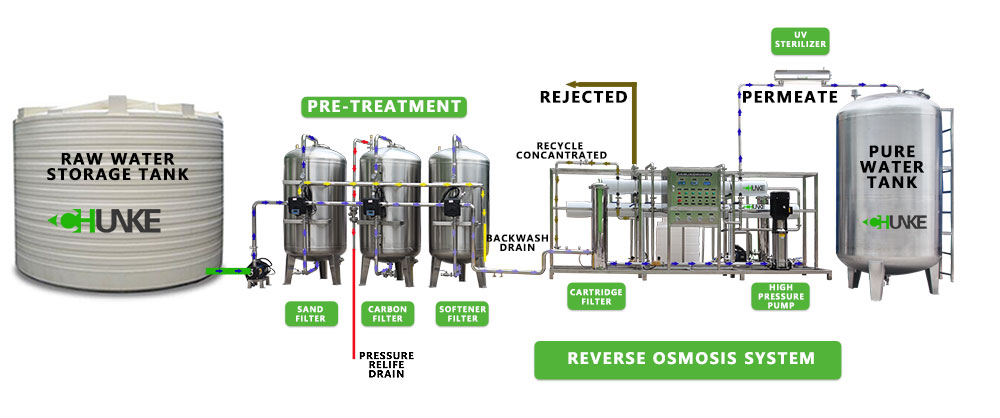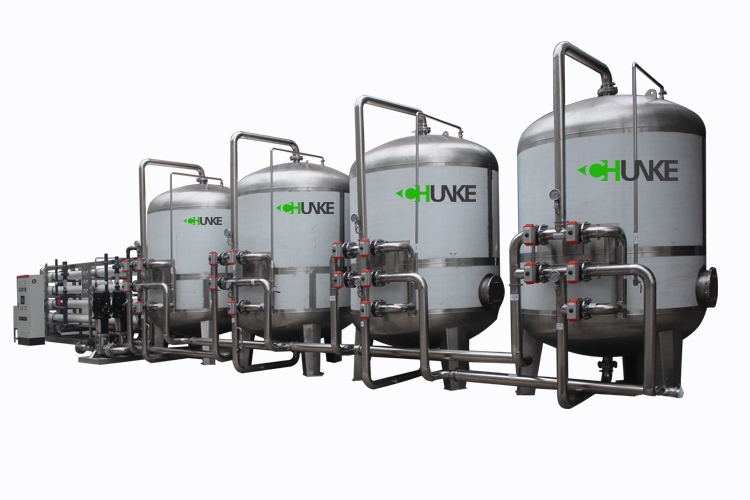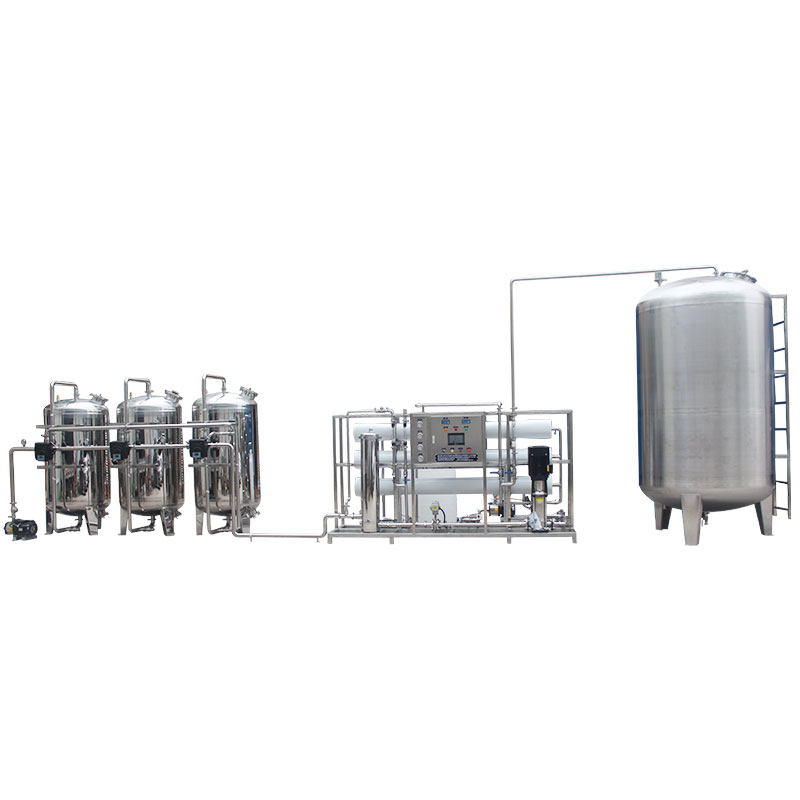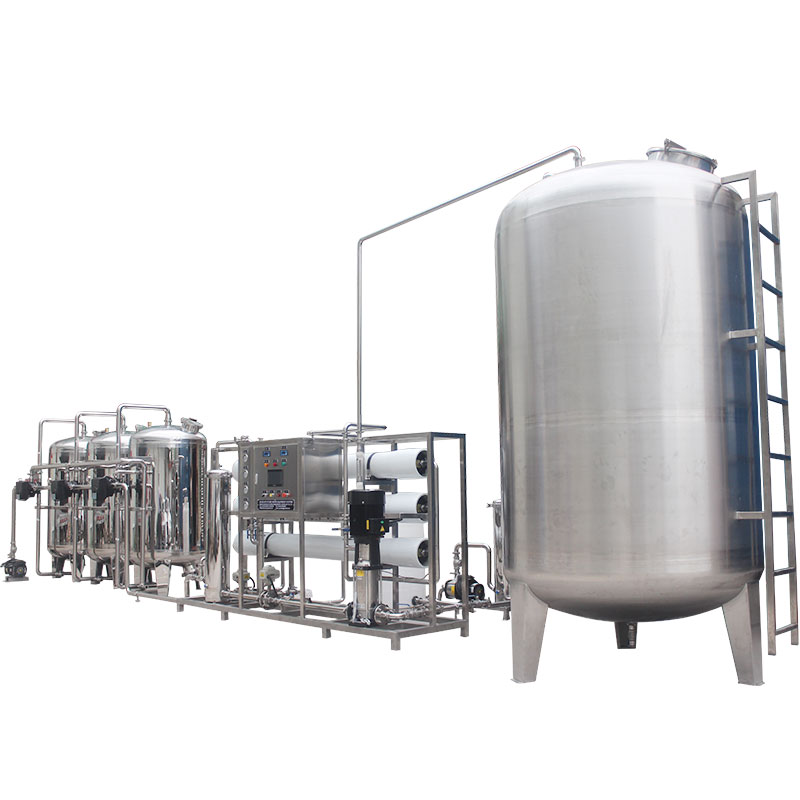Is water distilled by industrial distillation plants safe to drink?
Distilled water is a pure water obtained by heating water to evaporate it and condensing it for recovery. It is widely used in various industrial and laboratory environments. However, whether industrial distilled water is suitable for direct drinking, especially its difference from daily drinking water in terms of safety and health, is still a topic worth discussing.

What is the production process of distilled water?
Distillation is a process that uses the boiling point of water to separate impurities from water. By heating water to boiling, the water evaporates into steam, and then the steam condenses into liquid water, thus obtaining distilled water. This process can effectively remove most dissolved solids, heavy metals, minerals, and microorganisms in water.
The distillation process is based on the physical properties of water, especially the evaporation and condensation behavior of water at different temperatures. When water is heated to about 100 degrees Celsius, water molecules begin to evaporate, and most impurities, including dissolved salts, minerals, and organic pollutants, cannot evaporate with the water and are therefore separated.
Industrial distillation plants usually use large-scale distillation equipment, using multi-stage distillation or continuous distillation technology to ensure the mass production of high-purity distilled water. The production goal of these manufacturers is usually to provide high-purity water suitable for industrial applications, chemical analysis or laboratory use.
What are the application areas of industrial distilled water?
Industrial distilled water is widely used in a variety of fields, including the chemical industry, pharmaceutical industry, electronic manufacturing and laboratory analysis. In these application scenarios, the purity of water is extremely high, because any tiny impurities may affect the accuracy and reliability of the production process or experimental results.
Chemical industry
In the chemical industry, distilled water is often used as solvents, cleaning agents and reaction media. Its high purity ensures that no foreign impurities are introduced into the chemical reaction, ensuring the purity of the reaction and the accuracy of the results.
Pharmaceutical industry
In the pharmaceutical industry, distilled water is used to prepare drugs, prepare injections, and clean equipment and containers. The purity of pharmaceutical water is directly related to the quality and safety of drugs, so extremely high production standards and strict quality control are required.
Electronic manufacturing
In the electronic manufacturing process, distilled water is often used to clean semiconductor components and other precision electronic components. Since these components are extremely sensitive to contamination, any impurities may cause product failure or performance degradation, so the use of high-purity distilled water is crucial.
Laboratory analysis
Laboratories use distilled water for chemical analysis, instrument calibration, and preparation of standard solutions. High-purity distilled water can reduce experimental errors and ensure the accuracy of experimental results.

Is water distilled by industrial distillers safe to drink?
Despite its excellent performance in industrial and laboratory fields, there is still controversy over whether distilled water is suitable for direct drinking. The safety of drinking distilled water mainly depends on its purity, the impact of mineral deficiency on health, and the secondary pollution that may be generated during the production process.
Purity and drinking water standards
Distilled water contains almost no impurities and its purity is much higher than tap water or bottled water. However, it is this extremely high purity that makes distilled water lack minerals when drinking, such as calcium, magnesium, sodium, and potassium. These minerals play an important role in the human body, and long-term drinking of water lacking these minerals may lead to health problems such as electrolyte imbalance or osteoporosis.
Health effects of mineral deficiency
Minerals in drinking water are essential for human health. For example, calcium and magnesium help maintain bone health and cardiovascular function, while sodium and potassium play a key role in regulating water and electrolyte balance in the body. Long-term drinking of pure distilled water may lead to insufficient intake of these minerals, which may cause related health problems.
Risk of secondary contamination
Although the distillation process can remove most impurities, secondary contamination may occur if the production equipment and pipelines of the industrial distilled water plant are not strictly kept clean. For example, during the condensation process, the steam comes into contact with the condenser materials, and if these materials do not meet food-grade standards, harmful substances may be released into the water. In addition, microbial or chemical contaminants may also be introduced during storage and transportation.

Industrial distilled water vs. drinking water, what is the difference?
There are significant differences between industrial distilled water and specially produced drinking water in terms of production standards, quality control, and application areas. Necessary minerals are usually added during the production process of drinking water, and there are more stringent requirements in terms of hygiene and safety standards.
Production standards for drinking water
The production of drinking water usually needs to meet national or international health standards, which specify the maximum allowable concentration of mineral content, microbial limits, and other contaminants in water. For example, the World Health Organization (WHO) and the US Environmental Protection Agency (EPA) have specific regulations on the mineral content of drinking water to ensure its safety and health for the human body.
Production standards for industrial distilled water
The production goal of industrial distilled water is high purity. It usually does not pay attention to the mineral content, but focuses on removing all dissolved substances to adapt to industrial applications. Therefore, its production standards focus more on purity and pollution-free rather than whether it is suitable for human drinking.
Potential risks of drinking industrial distilled water
Although industrial distilled water is theoretically pure, there may be certain risks in drinking it directly due to the particularity of its production process and use environment. As mentioned earlier, the mineral content in distilled water is extremely low. Long-term drinking may cause the loss of important minerals in the human body and affect bone, heart, muscle and nerve function.
If the equipment of the industrial distilled water plant uses materials that are not suitable for drinking water treatment, such as certain metals or plastics, harmful substances may be released during the distillation process. In addition, residues of cleaning agents or disinfectants used in the production environment may also enter the distilled water, increasing the risk of chemical contamination.
Although distilled water can remove most microorganisms during the production process, there is still the possibility of microbial contamination if it is not properly handled during storage or transportation. Water storage facilities in industrial environments may not have food-grade sanitation conditions, which also increases the risk of distilled water being contaminated before use.

Conclusion: Industrial distilled water is not suitable for direct drinking
Based on the above analysis, although industrial distilled water is superior to conventional drinking water in purity, it is not recommended as daily drinking water because it lacks necessary minerals and may have secondary pollution and microbial risks. For drinking purposes, consumers should choose water sources that meet drinking water standards and undergo necessary treatment to ensure their safety and health benefits.
If consumers do need to drink distilled water, it is recommended to choose distilled water products designed and produced specifically for drinking. These products usually undergo additional mineral additions or other treatments to ensure their safety and nutritional value. At the same time, maintaining a balanced diet to supplement the minerals lacking in water is also an important measure to protect health.






